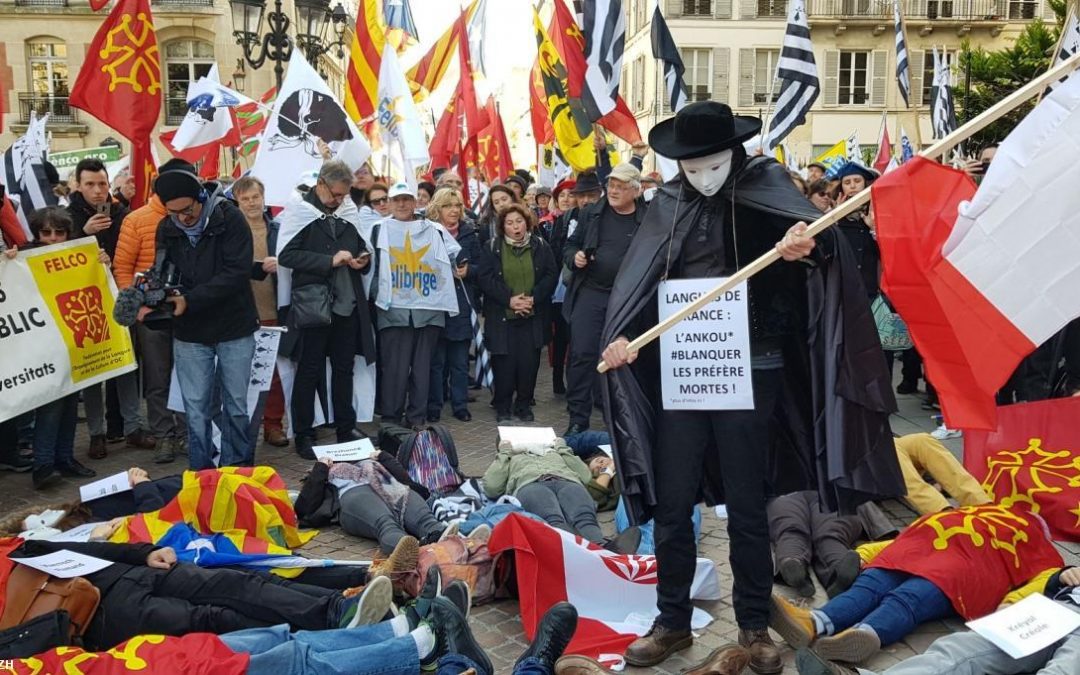The European Language Equality Network have called on President Macron to take urgent action to secure the future of territorial languages. The call comes the day before an general mobilisation of ELEN member organisations and partners where a total of 48 demonstrations will be held.
The letter states (French version below):
Dear President Macron,
Tomorrow, member organisations and partners of the European Language Equality Network (ELEN), the international NGO for the protection and promotion of European lesser-used languages, will hold 48 separate demonstrations across the French state in support of their territorial languages following the controversial censuring of the Molac Law on “regional” languages by the Constitutional Council, despite the National Assembly voting for it with a huge majority.
We broadly welcomed your May 26th statement on social media underlining the contribution of immersion education to “securing the future” of “regional” languages and support your call to the Government and Parliament to find ways to “guarantee the transmission of this linguistic diversity in accordance with the widely recognized educational frameworks.”
However, while these warm words are welcome, we are still waiting for the governing LREM party to deliver on their written commitment to us from 2017 to ratify the European Charter for Regional or Minority Languages, the European benchmark for language protection, a Charter which all EU accession States, for example, are obliged to ratify.
Furthermore, if we are to “secure the future” and “guarantee transmission” we will need to go further than merely modifying Article 2 of the Constitution. We urgently need to see some visionary language planning that is based on substantive language legislation which ensures: official status for each “regional” language in its territory; that gives support to full language recovery; that increases and ensures societal use; that helps to restore inter-generational transmission; that embeds immersion education into the education system; and which will eventually deliver language normalisation.
We know how to regenerate endangered and minoritised languages, and there is a wealth of best practice available on how to proceed. But it also requires political will. Can we be assured that you and your Government will deliver on the political will and language legislation required that will ensure the future for our languages?
On behalf of ELEN,
Davyth Hicks, ELEN Secretary-General (Bruxelles).
French version.
Cher Président Macron,
Demain, les organisations membres et partenaires du Réseau européen pour l’égalité des langues (ELEN), l’ONG internationale pour la protection et la promotion des langues européennes moins répandues, organiseront 48 manifestations distinctes à travers l’État français pour soutenir leurs langues territoriales à la suite de la censure controversée. de la loi molac sur les langues « régionales » par le Conseil constitutionnel, alors que l’Assemblée nationale l’a votée à une large majorité.
Nous avons largement salué votre déclaration du 26 mai sur les médias sociaux soulignant la contribution de l’éducation par immersion à «garantir l’avenir» des langues «régionales» et soutenons votre appel au gouvernement et au Parlement pour trouver les moyens de «garantir la transmission de cette diversité linguistique conformément avec les cadres pédagogiques largement reconnus.”
Cependant, si ces paroles chaleureuses sont les bienvenues, nous attendons toujours que le parti au pouvoir LREM tienne son engagement écrit envers nous à partir de 2017 de ratifier la Charte européenne des langues régionales ou minoritaires, la référence européenne pour la protection des langues, une charte qui Les États candidats à l’adhésion à l’UE, par exemple, sont obligés de ratifier.
De plus, si nous voulons «assurer l’avenir» et «garantir la transmission», nous devrons aller plus loin que la simple modification de l’article 2 de la Constitution. Nous avons besoin de toute urgence de voir une planification linguistique visionnaire basée sur une législation linguistique substantielle qui assure : un statut officiel pour chaque langue « régionale » sur son territoire ; qui soutient la récupération complète de la langue ; qui augmente et garantit une utilisation sociétale; qui aide à restaurer la transmission intergénérationnelle: qui intègre l’enseignement par immersion dans le système éducatif; et qui aboutira à terme à la normalisation de la langue.
Nous savons comment régénérer les langues en danger et minorisées, et il existe une multitude de bonnes pratiques disponibles sur la manière de procéder. Mais cela demande aussi une volonté politique. Pouvons-nous être assurés que vous et votre gouvernement respecterez la volonté politique et la législation linguistique nécessaires pour assurer l’avenir de nos langues?
Au nom d’ELEN,
Davyth Hicks, secrétaire général d’ELEN (Bruxelles).

